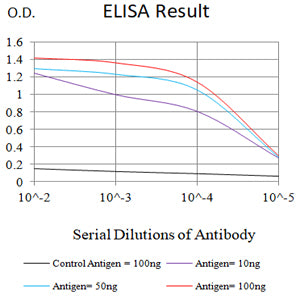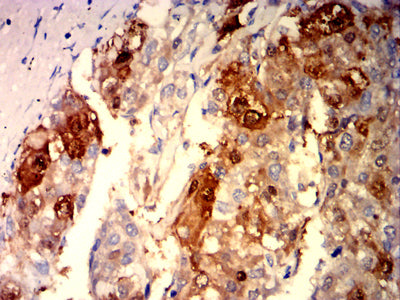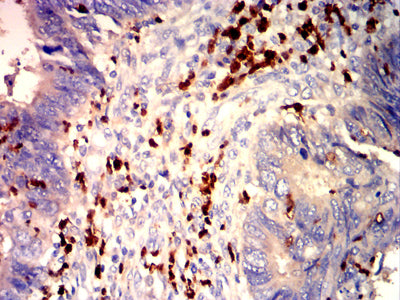


| WB | 咨询技术 | Human,Mouse,Rat |
| IF | 咨询技术 | Human,Mouse,Rat |
| IHC | 1/50-1/200 | Human,Mouse,Rat |
| ICC | 技术咨询 | Human,Mouse,Rat |
| FCM | 咨询技术 | Human,Mouse,Rat |
| Elisa | 1/2000-1/5000 | Human,Mouse,Rat |
| Aliases | ARG1 |
| Entrez GeneID | 383 |
| clone | 6B4B11 |
| WB Predicted band size | 34.7kDa |
| Host/Isotype | Mouse IgG1 |
| Antibody Type | Primary antibody |
| Storage | Store at 4°C short term. Aliquot and store at -20°C long term. Avoid freeze/thaw cycles. |
| Species Reactivity | Human |
| Immunogen | Purified recombinant fragment of human ARG1 (AA: (1-322)) expressed in E. Coli. |
| Formulation | Purified antibody in PBS with 0.05% sodium azide |
+ +
以下是关于NRP2抗体的3篇参考文献示例(文献信息为示例性概括,具体内容建议通过学术数据库核实):
---
1. **文献名称**: *Targeting Neuropilin-2 in Tumor-Associated Lymphatic Vessels to Inhibit Metastasis*
**作者**: Smith A, et al.
**摘要**: 研究报道了一种抗NRP2单克隆抗体通过阻断淋巴管内皮细胞的VEGF-C信号通路,显著抑制乳腺癌小鼠模型的淋巴结转移,表明其在抗肿瘤转移中的潜力。
2. **文献名称**: *Anti-Neuropilin-2 Antibody Enhances Anti-PD-1 Therapy by Reprogramming the Tumor Immune Microenvironment*
**作者**: Chen L, et al.
**摘要**: 该文献发现抗NRP2抗体可通过抑制调节性T细胞(Treg)的招募,增强PD-1抑制剂在黑色素瘤模型中的疗效,揭示了NRP2在免疫逃逸中的作用及联合治疗策略。
3. **文献名称**: *Structural and Functional Characterization of a Humanized Anti-NRP2 Antibody for Solid Tumors*
**作者**: Johnson R, et al.
**摘要**: 该研究通过人源化改造和表位分析,开发了一种高亲和力抗NRP2抗体,证实其可抑制肿瘤血管生成并增强化疗药物在实体瘤模型中的递送效率。
---
如需具体文献,建议通过PubMed或Google Scholar检索关键词“Neuropilin-2 antibody”、“anti-NRP2 therapeutic”获取最新研究。
Neuropilin-2 (NRP2) is a transmembrane glycoprotein belonging to the neuropilin family, initially identified as a receptor for class 3 semaphorins involved in neuronal guidance. It also functions as a co-receptor for vascular endothelial growth factors (VEGFs), playing roles in angiogenesis, lymphangiogenesis, and cellular signaling. NRP2 antibodies are essential tools for studying its expression, localization, and interaction networks in both physiological and pathological contexts. Structurally, NRP2 contains extracellular domains (a1/a2. b1/b2) that bind ligands and a cytoplasmic domain mediating intracellular signaling. Antibodies targeting specific epitopes (e.g., extracellular domains) enable detection via techniques like Western blotting, immunohistochemistry, or flow cytometry.
Research highlights NRP2's involvement in cancer progression, where it promotes tumor growth, metastasis, and immune evasion by modulating pathways like VEGF/VEGFR and TGF-β. Elevated NRP2 expression correlates with poor prognosis in cancers such as breast, pancreatic, and melanoma. Antibodies blocking NRP2-ligand interactions are explored for therapeutic potential, including anti-angiogenic strategies or immune checkpoint modulation. Additionally, NRP2 antibodies aid in studying neurodevelopmental processes, immune regulation (e.g., T-cell activation), and lymphatic disorders. Despite progress, challenges remain in understanding isoform-specific functions and optimizing antibody specificity for clinical applications.
×